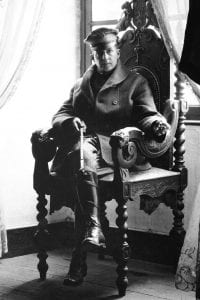“I have no spur
To prick the sides of my intent, but only
Vaulting ambition, which o’erleaps itself
And falls on the other.” – Macbeth (Act 1, Scene 7)
Themes of Macbeth:
One of the major themes in the play Macbeth by Shakespeare is how unchecked ambition causes a man’s downfall. Although characters other than Macbeth benefit from their ambition, as Banquo clearly has some of his own, the fatal conflict in Macbeth’s character is that his ambition drives him to commit deeds that destroy his inner peace. Ambition, in general, is tempered by a regard for society and a sense of moral responsibility. Macbeth’s disregard for these aspects is what causes his own downfall and that of Scotland.
Similarities Between the 1950s and Macbeth.
In the past weeks, we have been tasked to decipher the similarities of the 1950s and Macbeth. This week we covered many different historical events that connect with aspects of the play’s plot and themes. One event that has a very strong connection to this play, and in particular, the sentiment above, is the Korean war. The Korean war was fought between North and South Korea, two nations created by the collateral damage of WWII. When The Second World War ended, Korea, previously occupied by Japan, was split into two sides; the North occupied by communist Russia and the South occupied by the democratic USA and the UN. Leading the fight in the American supported South Korea was General Douglas MacArthur.
General MacArthur and The Korean War:
General MacArthur was a very prominent army figure, a general with a long list of deployments. Some would say that MacArthur was also ambitious from a young age. He was Valedictorian at the West Texas Military Academy where he attended high school, and First Captain at the United States Military Academy at West Point, where he graduated top of the class of 1903. When the Korean War started, he was unanimously recommended to become Commander-in-Chief of the United Nations Command. Once in-charge, MacArthur was immediately successful in forcing the North Korean troops to retreat. Soon MacArthur was able to push his offensive line to the 38th parallel, the original border. Unfortunately, this wasn’t the end for MacArthur and his troops. Although the original objective was to continue to fight for land in now communist China, their plans were stopped in their tracks.
In class I attempt Cornell note taking. This particular image includes the topic of the Korean War, and first sparked my interest on the topic.
The enemy now had help from the Chinese, which rendered significant losses to the American and other UN troops. Nevertheless, MacArthur’s officers downplayed the evidence about Chinese intervention in the war. They estimated that up to 71,000 Chinese soldiers were in the country, while the true number was closer to 300,000. After further research, I realized that MacArthur revealed false numbers because he was adamant that he would eventually win, even though the odds showed otherwise. This is where his ambition lead him astray.
“I am in blood
Stepped in so far that, should I wade no more,
Returning were as tedious as go o’er.” – Macbeth (Act 3, Scene 4)
What did General Douglas MacArthur do next? As Southern China and Norther Korea fell back under Communist control, MacArthur’s unchecked ambition eventually led to his demise. After talks with many of his associates, he decided that the best way to win was to use an atomic bomb on China. It became clear that his ambition to win the war had overcome his moral responsibilities as a human being. Obviously, he never used an atomic bomb, otherwise this would be the topic of the entire project. Even though the president finally denied him the use if bombs, he stayed persistent in his belief of this immoral action. An action that eventually led him to be excused from the army, by the President of the United States.
“I fired him because he wouldn’t respect the authority of the President. I didn’t fire him because he was a dumb son of a bitch, although he was, but that’s not against the law for generals. If it was, half to three-quarters of them would be in jail.” – Truman
General MacArther and Macbeth:
General MacArthur and Macbeth have many similarities in both characteristics and actions. Both of them took the leadership role only to eventually lose all morality while protecting their position and reputation. These two stories are strung together by the reckless power of unchecked ambition. A power that I am starting to recognize as a larger theme in this unit.
Here is a short (self made) animated gif symbolizing the end of the play. I animated on Animation Desk, and created the gif using the free website EZGif.com.
Citations:
History.com Editors. “Douglas MacArthur.” History.com, A&E Television Networks, 29 Oct. 2009, www.history.com/topics/world-war-ii/douglas-macarthur. Accessed Mar 4, 2020.
History.com Editors. “Korean War.” History.com. A&E Television Networks, November 9, 2009. https://www.history.com/topics/korea/korean-war. Accessed Mar 4, 2020.
SparkNotes. SparkNotes, n.d. https://www.sparknotes.com/shakespeare/macbeth/themes/. Accessed Mar 4, 2020.
“Macbeth by William Shakespeare.” enotes.com. enotes.com, n.d. https://www.enotes.com/homework-help/explain-briefly-antagonist-protagonist-macbeth-216167. Accessed Mar 4, 2020.






marshalla February 10, 2020
Nice post bro! The connection was really interesting and something I never would’ve picked. Where do you think the line between unchecked ambition and recklessness is? Do you think they’re they the same thing? Really enjoyed this.